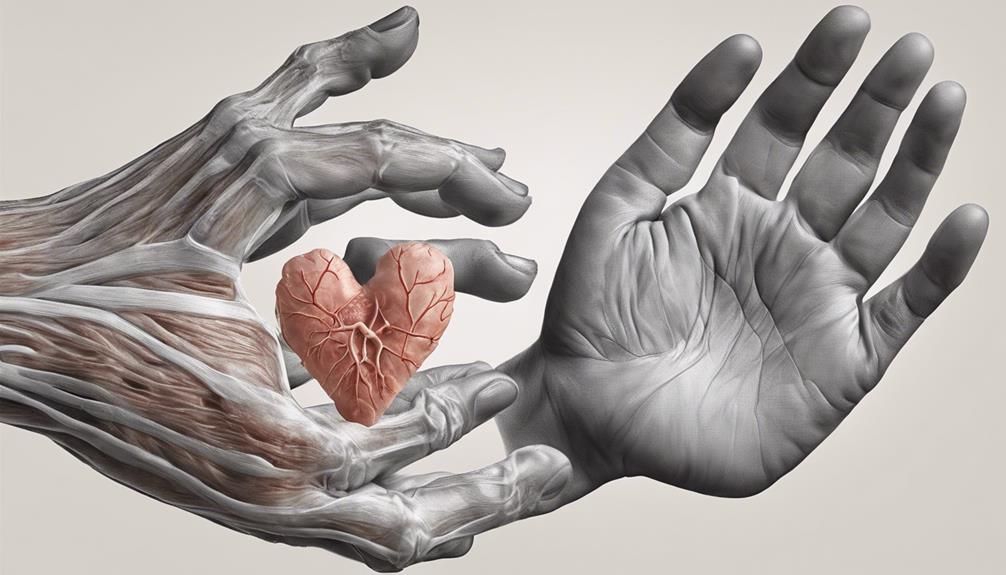Dehydration can lead to a loss of appetite. When we don't drink enough water, our bodies can get confused, making us feel less hungry. Not having the right balance of water and electrolytes can mess up our hunger signals. It's important to stay hydrated for our appetite and digestion to work well. Symptoms like feeling less interested in food, being thirsty, or having dry mouth can show we need more water. Remember, proper hydration is key for appetite regulation. Understanding how dehydration affects us can help us make healthier choices. Learn more about how water influences our hunger cues.
Key Takeaways
- Dehydration can lead to reduced appetite due to confusion between thirst and hunger signals.
- Electrolyte imbalance from dehydration can disrupt hunger hormones, suppressing appetite.
- Proper hydration is essential for regulating appetite and preventing dehydration-related appetite loss.
- Dehydration may mask hunger signals with thirst, impacting metabolism and appetite.
- Addressing dehydration promptly with increased water intake and hydrating foods can restore appetite.
Dehydration and Appetite Connection
When we become dehydrated, our body's decreased blood flow to the digestive system can disrupt hunger cues, potentially leading to a loss of appetite. Dehydration, often caused by not drinking enough water, can make us feel thirsty and tired.
Our body needs water to function correctly, and when we don't have enough, it can affect our appetite. The lack of water can mess with our electrolyte levels, important minerals that help our body work well. This imbalance in electrolytes can throw off our body's natural signals, like hunger and fullness.
It's like our body is confused and doesn't know if it's thirsty or hungry. So, it decides to conserve water instead of telling us we need to eat. That's why staying hydrated is super important. Drinking enough water keeps our body happy, our appetite in check, and our digestion running smoothly.
Symptoms of Dehydration-Related Appetite Loss

Dehydration-related appetite loss manifests through symptoms such as reduced interest in food, decreased saliva production, and dry mouth. When we experience dehydration, our body conserves water by reducing saliva, leading to a dry sensation in the mouth. This dryness can make it challenging to chew and swallow food, causing a decreased interest in eating.
Additionally, feeling thirsty accompanies appetite loss during dehydration because our body prioritizes the need for water over food. Appetite suppression occurs as a result of our body's focus on maintaining hydration levels rather than signaling hunger.
Recognizing these symptoms is vital in addressing dehydration-related appetite loss promptly. By understanding the signs of reduced interest in food, decreased saliva production, dry mouth, feeling thirsty, and appetite suppression, we can take steps to rehydrate effectively. Restoring proper hydration levels not only helps regain appetite but also prevents further complications associated with inadequate fluid intake.
Impact of Dehydration on Hunger Signals
Dehydration can mess with our body's signals, making us feel less hungry. When we don't drink enough water, our brain might confuse thirst for hunger.
This mix-up can mess with how our body tells us it's time to eat.
Appetite Regulation Mechanisms
Understanding how hydration levels impact hormone signals like ghrelin and leptin is pivotal for comprehending the connection between dehydration and appetite regulation mechanisms.
When we become dehydrated, our body's electrolyte balance can be thrown off, affecting how our brain interprets signals of hunger and fullness. Ghrelin, known as the hunger hormone, tends to increase when we're dehydrated, potentially leading to an increase in appetite.
On the other hand, leptin, the hormone responsible for signaling fullness, may be impacted by dehydration, potentially causing disruptions in our feeling of satisfaction after eating. This disruption can lead to overeating, as the body may not receive the appropriate cues to stop consuming food. Furthermore, research suggests that dehydration can amplify the effects of leptin resistance, which might explain why older men experience reduced sensation of fullness. Consequently, maintaining proper hydration is crucial not only for overall health but also for fostering better appetite regulation, particularly as we age.
Maintaining proper hydration is essential for keeping these hunger and fullness signals in check, ensuring our appetite regulation mechanisms function optimally.
Thirst Vs Hunger Signals
When our bodies lack sufficient hydration, the importance between thirst and hunger signals can become blurred, potentially leading to confusion in interpreting our physiological needs. Dehydration can mask the sensation of hunger as thirst signals take precedence in the body. This can result in reduced appetite and decreased water intake, affecting appetite regulation.
Proper hydration is vital for supporting the body's mechanisms that regulate hunger and satiety. Studies suggest that staying adequately hydrated can help prevent confusion between thirst and hunger cues. By recognizing the significance of maintaining proper water intake, we can guarantee that our bodies receive the hydration needed to distinguish between thirst and hunger signals accurately, ultimately supporting healthy appetite regulation.
Dehydration Impacts Metabolism
Recognizing the blurred lines between thirst and hunger signals, our bodies adjust metabolism in response to dehydration, impacting appetite regulation. When dehydrated, hormone levels can fluctuate, affecting hunger signals like ghrelin and leptin. These changes may lead to a decrease in appetite or altered eating patterns.
Dehydration-induced shifts in metabolism can also influence how the brain perceives hunger cues, potentially causing a loss of appetite. To maintain a healthy appetite and accurate hunger signals, it's important to stay hydrated. Drinking enough fluids helps regulate metabolism, ensuring that hunger and thirst signals are properly distinguished.
Addressing Appetite Loss Due to Dehydration

When dehydration impacts our bodies, it can interfere with our hunger signals, making us feel less inclined to eat.
To address appetite loss from dehydration, it's essential to concentrate on rehydrating properly.
Hydration Impact on Appetite
To comprehend the impact of hydration on appetite, it's important to acknowledge the interconnected relationship between proper fluid intake and maintaining a healthy level of hunger. When it comes to appetite perception, dehydration can play a significant role in causing loss of appetite. Here are some key points to bear in mind:
- Dehydration can confuse the body's signals for hunger and thirst.
- Inadequate hydration may affect taste perception, leading to reduced appetite.
- Dehydration-induced fatigue and weakness can contribute to decreased appetite.
- Proper fluid intake is essential to support a healthy appetite and prevent appetite loss.
Strategies to Rehydrate
Addressing the impact of dehydration on appetite involves implementing effective strategies for rehydration to combat appetite loss effectively. To rehydrate, increasing water intake is vital. Consuming water-rich foods like fruits and vegetables can aid in replenishing fluids. Fluid intake can be boosted by incorporating soups, broths, and herbal teas into the diet. Electrolyte-rich beverages such as coconut water or sports drinks help restore electrolyte balance.
Monitoring urine color and thirst cues is important, and setting hydration reminders can be beneficial in ensuring adequate fluid intake. By following these strategies and incorporating hydrating beverages and foods, appetite loss due to dehydration can be effectively addressed.
Preventing Appetite Suppression From Dehydration

Regularly maintaining proper hydration levels is essential in preventing appetite suppression caused by dehydration. To guarantee you stay hydrated and keep your appetite in check, consider the following tips:
- Drink Plenty of Water: Aim to consume at least 8-10 cups of water daily to stay adequately hydrated and support your body's functions.
- Eat Hydrating Foods: Include fruits and vegetables with high water content, such as watermelon, cucumbers, and oranges, in your diet.
- Monitor Your Fluid Intake: Keep tabs on how much water you're drinking, especially on hot days or when you're feeling under the weather.
- Set Reminders: Use apps or alarms to prompt yourself to drink water throughout the day, ensuring you stay properly hydrated.
Dehydration-Induced Weight Loss Effects

How does dehydration impact weight loss in relation to appetite regulation?
Dehydration-induced weight loss effects are primarily due to fluid loss rather than fat or muscle loss. When we become dehydrated, our body's signals for thirst and hunger can get mixed up, leading to a decrease in food intake. Studies have shown that dehydration can disrupt appetite-regulating hormones, causing a reduction in hunger and overall food consumption. Severe dehydration can even affect metabolism and nutrient absorption, further suppressing appetite and contributing to weight loss.
It's essential to understand that the weight loss experienced from dehydration is usually temporary and can be reversed by properly rehydrating the body. Replenishing lost fluids helps restore normal appetite levels and prevents ongoing weight loss associated with dehydration. Remember, the key to maintaining a healthy weight isn't through dehydration-induced weight loss but by staying hydrated and nourishing your body with the right nutrients. Stay mindful of your fluid intake to support your metabolism and overall well-being.
Hydration Strategies for Appetite Restoration

Dehydration's impact on appetite can be effectively countered through strategic hydration methods focused on restoring one's desire for food. To restore appetite, consider the following hydration strategies:
- Boost Fluid Intake: Make sure you're drinking enough water throughout the day to prevent dehydration, which can contribute to a loss of appetite.
- Consume Water-Rich Foods: Include fruits and vegetables with high water content into your diet to help rehydrate the body and support appetite restoration.
- Opt for Electrolyte-Rich Beverages: Electrolyte-rich drinks can aid in replenishing fluids lost through dehydration and help in recovering your appetite.
- Monitor Hydration Levels: Pay attention to signs of dehydration like dark urine or dry mouth, and address them promptly to prevent a decline in appetite.
Frequently Asked Questions
Can Dehydration Cause Nausea and Loss of Appetite?
When dehydrated, we may experience nausea and loss of appetite as our body's response to fluid imbalance. It can worsen without increased fluid intake. Rehydrating promptly can alleviate these symptoms, preventing digestive issues associated with dehydration.
What Are the 5 Warning Signs of Dehydration?
We often overlook the 5 warning signs of dehydration: dry mouth, dark urine, fatigue, dizziness, and confusion. These cues signal our body's need for hydration. Let's prioritize fluid intake for better health and well-being.
What Is the Fastest Way to Cure Dehydration?
To cure dehydration quickly, it is crucial to drink water or oral rehydration solutions. These choices aid in restoring lost fluids rapidly. Hydrating regularly is vital to sustain proper body function and avoid dehydration-related problems.
What Are the Symptoms of Body Dehydration?
When we're dehydrated, our bodies send signals like dry mouth, dark urine, fatigue, dizziness, and confusion. It can lead to a decreased appetite as thirst and hunger cues get mixed up. Staying hydrated is key for overall health.
Conclusion
To sum up, dehydration can indeed lead to a decrease in appetite. It's crucial to stay adequately hydrated to guarantee your body functions at its best, including hunger signals.
If you find yourself not feeling hungry, try drinking water first to see if it helps. Remember, staying hydrated is essential for maintaining a healthy appetite and overall well-being.
So, grab that water bottle and keep yourself hydrated to keep your appetite in check!









